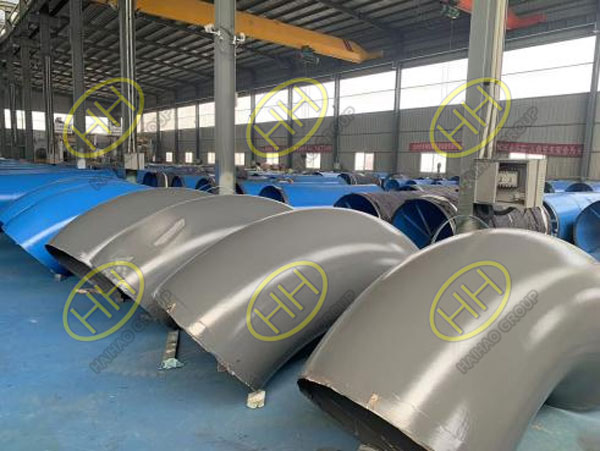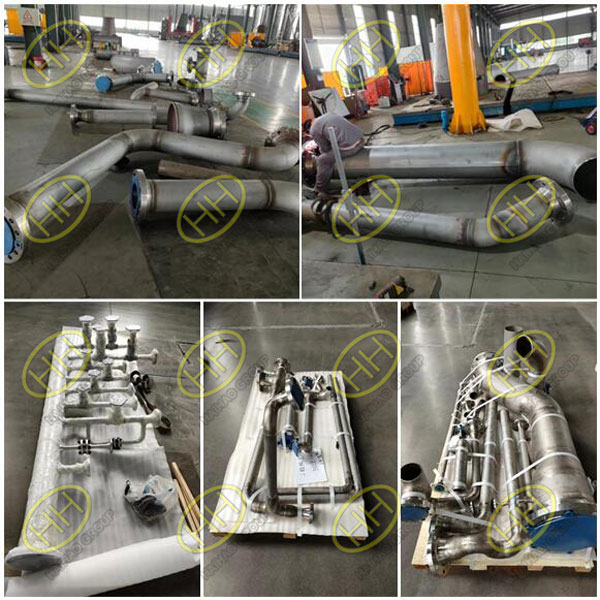How to choose the right materials of pipeline for diverse marine environments?
Submarine pipelines play a crucial role in transporting resources across vast underwater distances. As the demands and complexities of these projects continue to grow, selecting the appropriate materials becomes paramount. At Haihao Group, we understand the criticality of this decision and are committed to providing valuable insights on choosing the right materials for submarine pipelines based on specific marine environments. Let’s delve into the two key factors: corrosiveness and water pressure.
Corrosiveness Analysis:
The corrosiveness of a marine environment can vary significantly depending on the geographical location. Factors such as salinity, presence of sulfides, oxygen levels, and temperature fluctuations all contribute to the corrosive nature of the water. It is crucial to carefully assess the corrosive potential to determine the most suitable material for your submarine pipeline.

Elbows coated FBE
Low to Moderate Corrosiveness: In areas where the corrosiveness is relatively low to moderate, materials such as carbon steel or stainless steel can be viable options. Carbon steel pipes are cost-effective and provide adequate corrosion resistance when properly coated. Stainless steel pipes, particularly those made from duplex or super duplex stainless steel, offer enhanced resistance to corrosion, making them suitable for mildly corrosive marine environments.
High Corrosiveness: In highly corrosive marine environments, special consideration must be given to the choice of materials. Corrosion-resistant alloys like Inconel, Monel, or titanium are excellent options due to their exceptional resistance to corrosion. These alloys offer superior protection against aggressive elements, ensuring the longevity and integrity of your submarine pipeline in even the most hostile environments.
Water Pressure Analysis:
Water pressure is another critical factor to consider when selecting materials for submarine pipelines, as it increases with water depth. The ability of a material to withstand high pressure is crucial to prevent failures and ensure the structural integrity of the pipeline.
Shallow Water: In shallow-water applications, materials such as carbon steel or high-strength steel can effectively withstand the moderate pressures encountered. These materials are commonly used due to their favorable combination of strength, cost-efficiency, and corrosion resistance.
Deep Water: As water depth increases, the pressure exerted on the submarine pipeline becomes more significant. In such cases, materials with superior strength and pressure resistance are required. High-strength alloys like API 5L X70 or X80, coupled with corrosion-resistant coatings, offer excellent performance in deep-water environments. These materials provide the necessary strength and durability to withstand the immense pressures at greater depths.

Prefabricated Pipes
At Haihao Group, we understand the unique challenges posed by diverse marine environments and offer a wide range of materials tailored to meet these demands. Our extensive selection of corrosion-resistant alloys, high-strength steels, and specialized coatings ensures that you can choose the most suitable material for your submarine pipeline, regardless of the corrosiveness or water pressure.
Our dedicated team of experts is here to assist you in navigating the complexities of material selection, taking into account the specific requirements of your submarine pipeline project. With our comprehensive knowledge and expertise, we will help you make informed decisions, ensuring the success and longevity of your submarine pipeline infrastructure.
Choose wisely, choose Haihao Group, and embark on a voyage of excellence in submarine pipeline projects. Contact us today to explore our diverse range of materials and experience the Haihao Group advantage in delivering exceptional solutions for your marine infrastructure needs.

